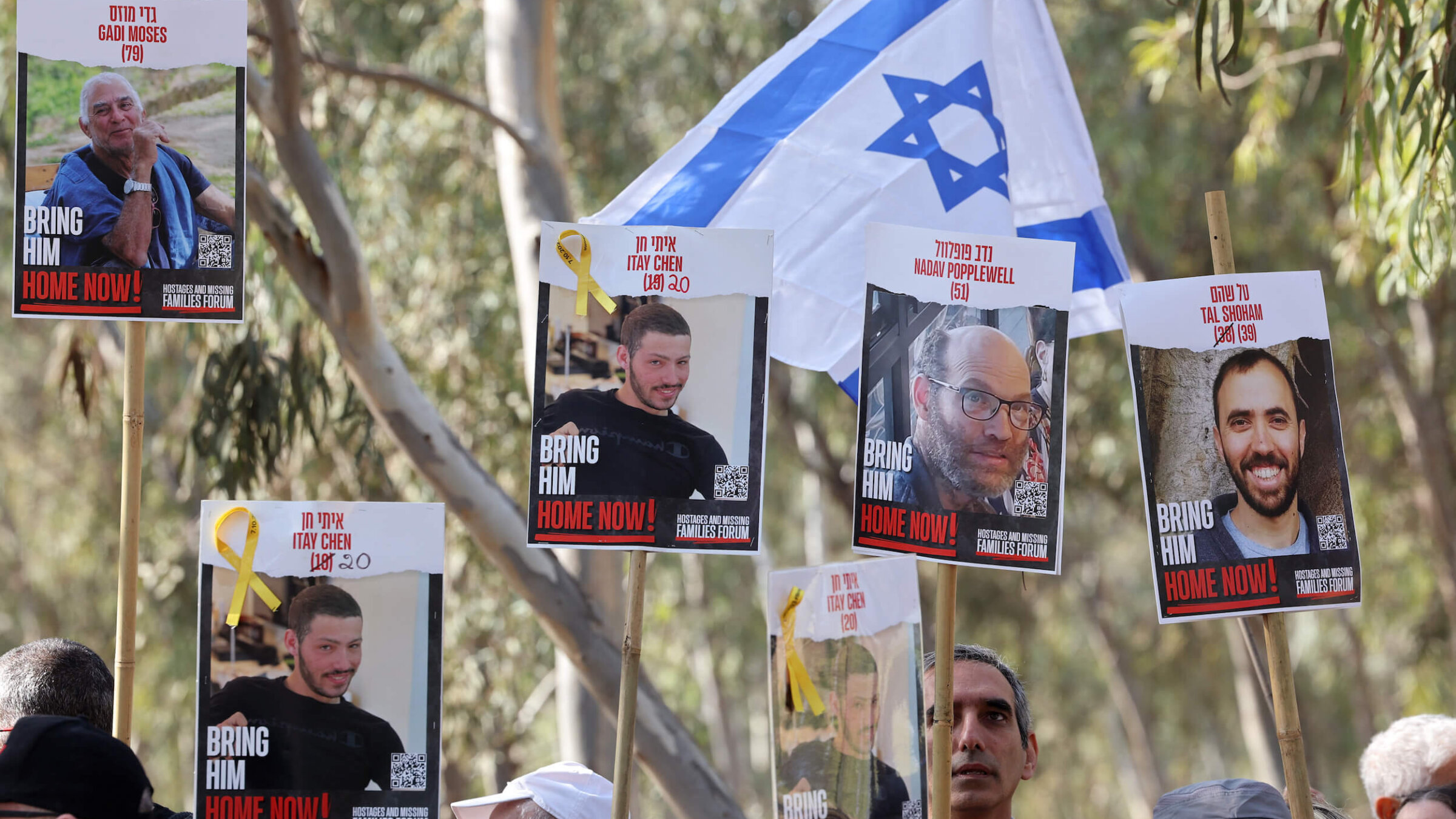‘They are the real men of Israel’: My cousin was held captive with hostages who died in Gaza — hear her words
This week’s news that four hostages had died in captivity was a blow to those who hoped for their return — and those, once held with them, who survived their ordeal

Nadav Popplewell, pictured second from right, was one of four hostages announced this week to have been found dead in Gaza. Photo by Jack Guez / AFP / Getty Images
Every day, family members of hostages — like myself — wake up to face a ticking time bomb. We check the news with a lump in our throats: What will today bring?
Earlier this week, that daily news made my heart stop. In just one day, we learned that four male hostages — Chaim Peri, 79, Amiram Cooper, 84, Yoram Metzger, 80, and Nadav Popplewell, 51 — had died while in captivity.
The one family member I have who remains a hostage in Gaza, my cousin’s husband, David Cunio, was not on the list; neither was his brother, Ariel. But my heart still ached for the deceased hostages’ families, whose time spent hoping for the return of their loved ones had officially expired.
These four deaths are particularly heartrending, because, for them, it genuinely could have turned out differently. Unlike some other cases of hostage deaths, these men were confirmed to be alive for some of their time held captive by Hamas. Their deaths bring the number of hostages known to have been killed while in captivity to 18 — ironically, the symbolic number in Jewish culture that represents the word “chai”, meaning life.
I personally know they were alive, because my family shared time in captivity together with them.
My cousin, Danielle Alony, and her now 6-year-old daughter, Amelia, were relegated to the dark tunnels under Gaza where they met Peri, Popplewell and Metzger. It is hard to make sense of this tragedy knowing that it could have, or rather should have, been different. So I asked Danielle, who since her release in November has become a powerful advocate for the hostages, to share her first-hand perspective.
“One of the most difficult sights in captivity was the sight of the elderly, who could easily be the parents or grandparents of each and every one of us,” she wrote me, in Hebrew; I’ve translated all that follows:
“They arrived wounded, after trying to fend off armed terrorists with their bare hands and no weapons; they had not given up easily. In captivity, the adults were kept in difficult conditions that you cannot comprehend — densely packed together on smelly mattresses, in small and cave-like spaces with unbearable humidity, 20-30 meters underground.
“Weeks went by where they could not change their clothes or bathe. The food they received was meager, and never enough to last a week.
“For months, they didn’t get to see the light of day, not since they were kidnapped from their homes on the morning of Oct. 7. As time went by, they became thinner and thinner. Their faces lost color, and their health deteriorated. Most of them didn’t get the medicine they needed, but even as their health was getting worse I didn’t hear them cry, unlike myself; I eventually stopped counting the number of times tears spontaneously flowed from my eyes.
“I never heard them complain about the lack of oxygen, food, humidity or the terrible heat. They were stronger than you can imagine.
“They are the real men of Israel, the men who belong to the generation that built the country, a generation that built the houses by themselves and established communities and kibbutzim from scratch. These men were the anchors of their families — families who were left to painfully wage a fierce and persistent struggle to demand their release for eight months, non-stop. These were men who survived everything with almost an attitude of calm. These are the men who expected and especially hoped that they would be saved because they were ailing and old, with already little time left in this world.
“But they were not saved. They weren’t saved on Oct. 7 when this terrible lawlessness emerged. And they were not saved in the eight months of continued neglect and abandonment by our leaders, which resulted in the needless and tragic deaths of these courageous men, who spent their last moments of life in a horrible hell, on borrowed time.”
After the four men’s deaths were announced, IDF Spokesman Daniel Hagari said “We estimate that the four were killed together, in the Khan Younis area, several months ago, while being held by Hamas terrorists and while IDF forces were operating in Khan Younis.” I try to imagine how it feels for their families to discover they’ve been dead for months. I think it must be a mix of desolation and betrayal, but I push those feelings aside because I won’t allow myself to lose the shred of hope that’s left for my own family.
When I reflect on my cousin’s poignant words, I can’t help but linger on the feeling of borrowed time. Is the fate of our loved ones who remain, for now, alive in Gaza really inevitable? Or will our leaders finally rise to the occasion and save the innocent souls we are witnessing drain through the hourglass? Every morning that comes and goes without a deal to release the hostages and end the war is the start of another day made insufferable by the torturous passing of time.















